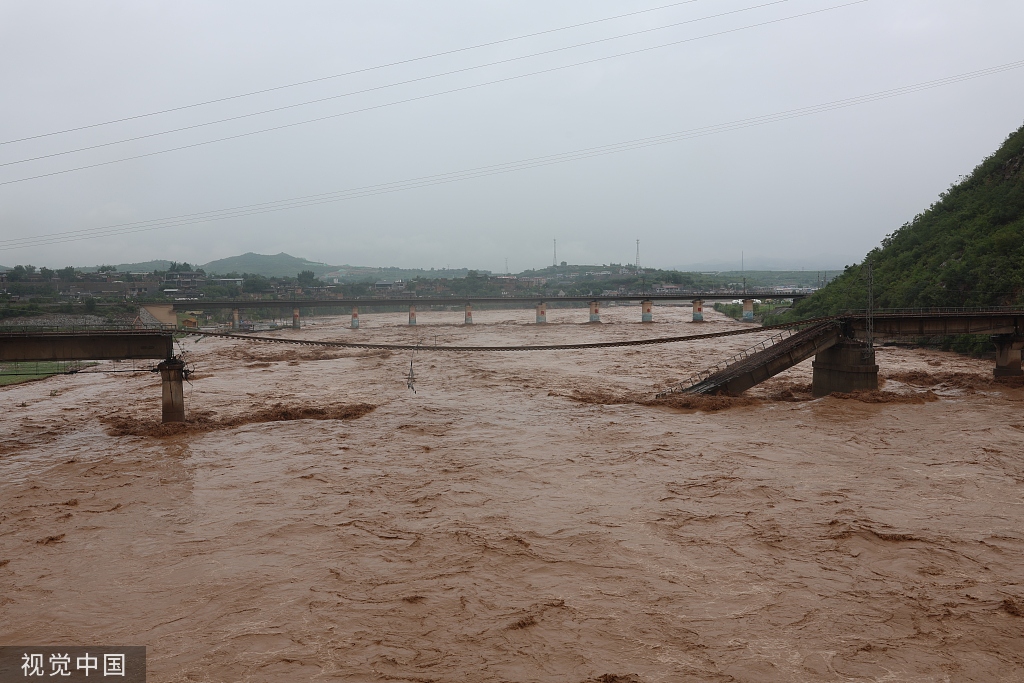Detention limits flood havoc


Low-lying lakes, wetlands, farms, even residential areas come to use in Hebei
Hebei province has made use of seven detention areas to effectively reduce floodwater pressure in the basin, a senior official from the provincial water authority said.
The province witnessed 144 hours of heavy rainfall over the week, which stopped on Wednesday.
During the period, the province recorded an average rainfall of 146.2 millimeters, amounting to about 27.5 billion cubic meters of water, which is more than double the combined total storage capacity of all large and medium-sized reservoirs in Hebei, chinanews.com reported.
As of Wednesday, the province had diverted about 1.8 billion cubic meters of floodwater to detention areas, according to the provincial emergency management department.
A detention basin is an area that is designed or designated for the temporary or permanent retention of floodwaters. "These low-lying areas include lakes, wetlands, farms and even residential areas," Cheng Xiaotao, deputy chief engineer of the China Institute of Water Resources and Hydropower Research, told China Central Television.
More than 850,000 residents living around the detention areas, including Xiaoqing River, Langouwa and Dongdian, have been relocated to safety, the emergency management department said, adding that another 370,000 people have been evacuated from other regions.
"The flood detention areas that we used turned out to be effective," Li Na, deputy head of the Department of Water Resources of Hebei province, told CCTV on Wednesday night.
In particular, two detention areas near Zhuozhou, which was still facing waterlogging on Thursday, have played an important role in retaining flood from a branch of the Daqing River.
"If it had not been for the two areas controlling floodwaters, the pressure on downstream flood control in Xiong'an and Tianjin would have been very heavy," she said.
The provincial top leadership highlighted the importance of flood control by coordinating resources. "We should strengthen the inspection of reservoirs, dams and flood channels to comprehensively defuse risks and ensure the safety of surrounding areas," Ni Yuefeng, secretary of Hebei Provincial Committee of the Communist Party of China, said during an inspection tour of Baoding on Tuesday.
The floodwaters that have flowed into the detention areas will recede along their original path after the water level drops in major rivers, he added.
Since the rain stopped on Wednesday, the water levels in the rivers have started to drop and thus the amount of water in the flood detention areas will gradually reduce, said Li, from Hebei's department of water resources.
Some villages located in higher areas will see the waterline receding in about a week, while the water might take up to a month to retreat from low-lying areas, Li said.
"The country will compensate for the civil losses suffered including to crops, livestock and housing, according to regulations," Cheng said.
For example, the cost of properties damaged in the detention areas due to flooding will be compensated by 70 percent, according to the interim measures for compensation in detention areas.
zhangyu1@chinadaily.com.cn
- PM2.5 drops to lowest level in Beijing in 1st 11 months of 2025
- Number of digital consumers in China tops 958 million
- China issues regulation to promote public reading
- China's State Council Information Office hosts 2026 New Year reception
- Senior CPC official urges sound planning for 15th Five-Year Plan period
- 430 kg of cocaine seized in Shenzhen on US intel





































